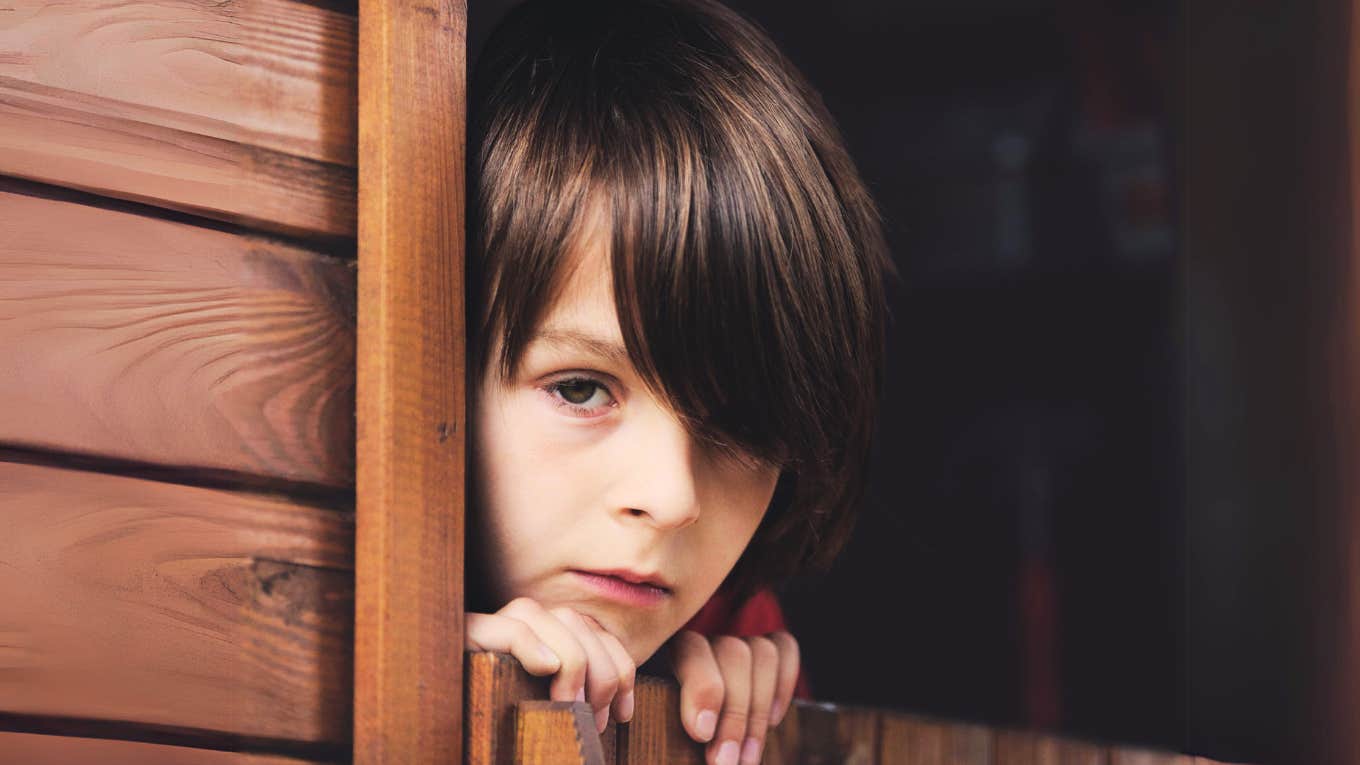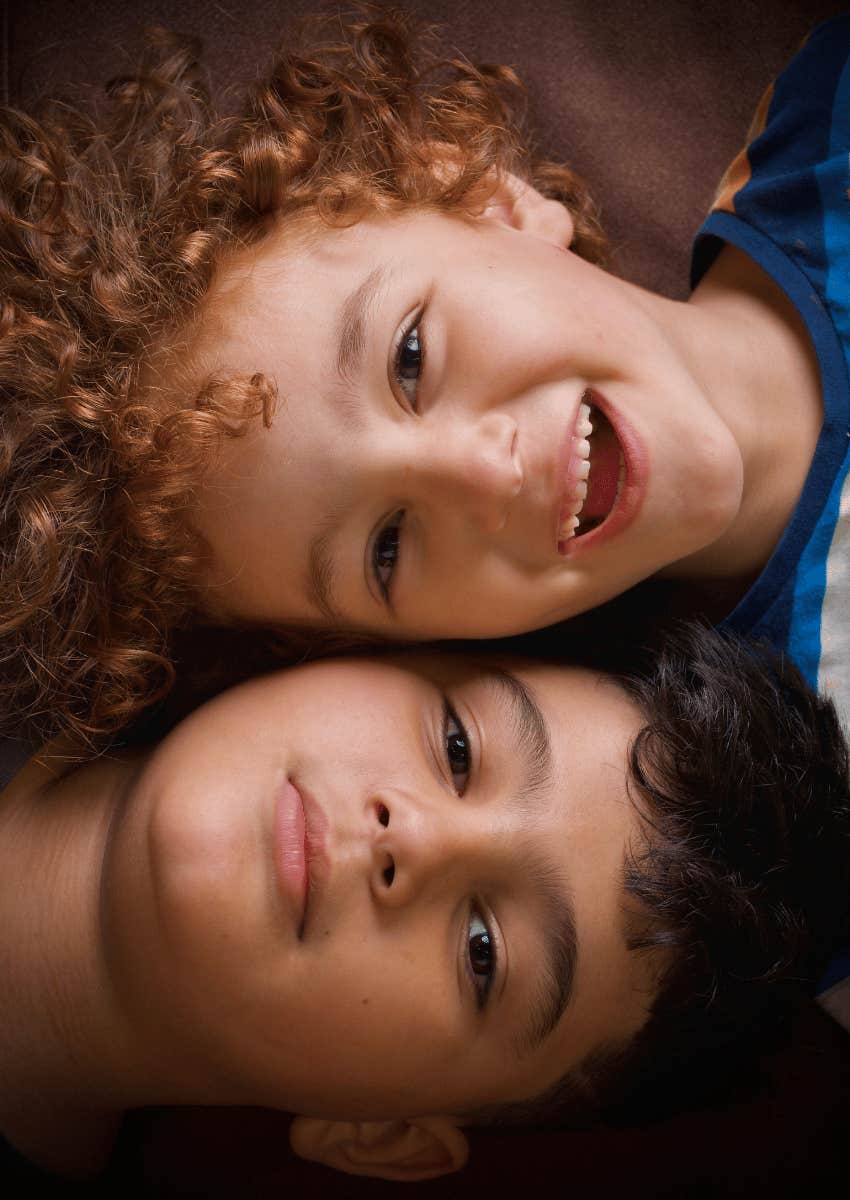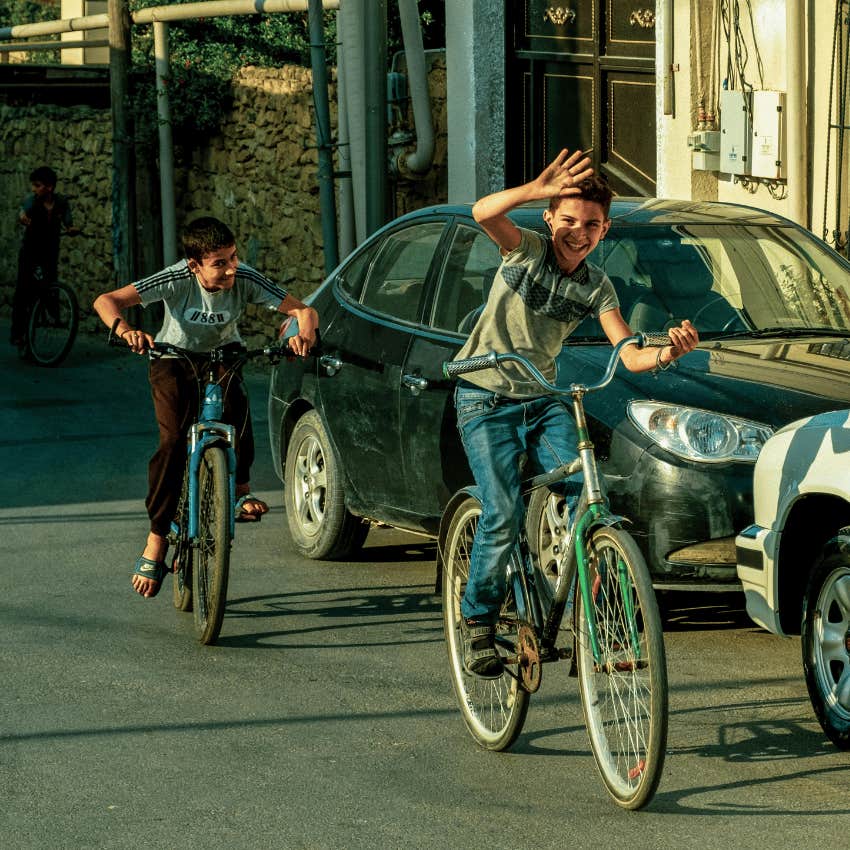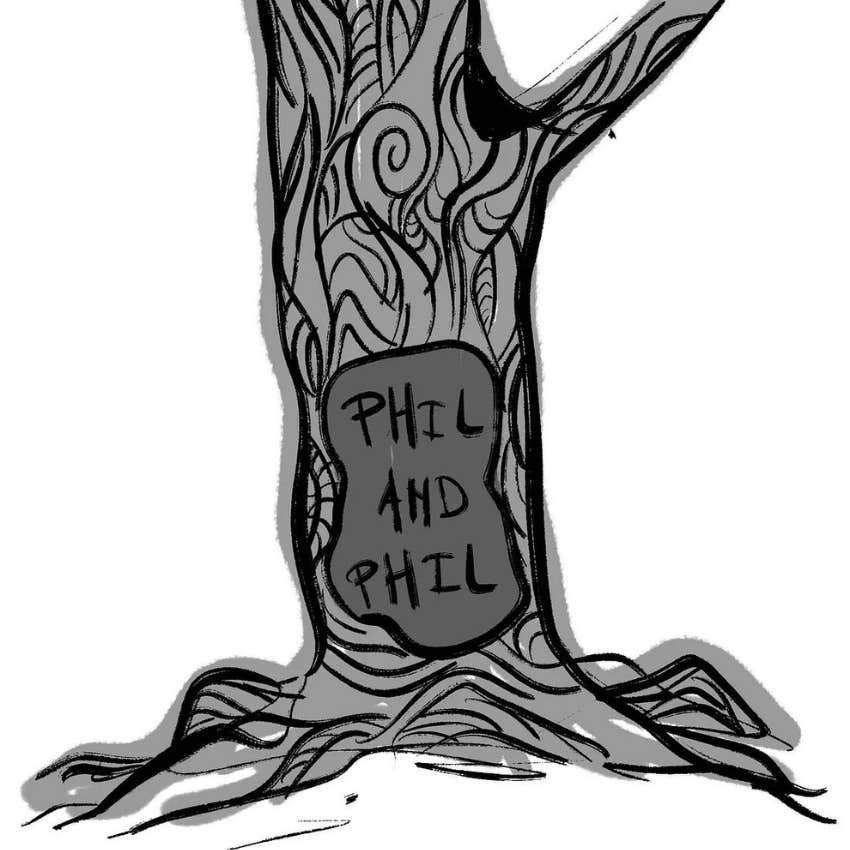A Friendship Gone Wrong — 'I Wouldn’t Wish Myself On My Worst Best Friend'
An innocent friendship took a turn for the worse, and then turned even worse.
 tatyana_tomsickova | Canva
tatyana_tomsickova | Canva There’s a tree in Maine that bears the following words: “Phil And Phil.” One of the Phils stands for my middle name, which is Philip. The other Phil stands for Phil, the little brother of James, who was my brother’s best friend in those days.
“I have an idea,” people said. “You younger brothers should be friends too.” People said this because of our older brothers’ friendship and because of the Phil thing.
“Listen, people,” I said, “shouldn’t friendships be based on more than coincidences?”
“No,” said the people. “This is a small town. Coincidences are all we have for you. Be grateful.”
So, Phil and I tried friendship. We started big by turning ourselves into a club: The Phil-And-Phil.
Though Phil was younger and smaller than me, he shrewdly rose to my level, liking the things I liked:
- Raiders of the Lost Ark
- Monsters
- Indiana Jones and the Temple of Doom
- Pyramids
- Indiana Jones and the Last Crusade
- Ninjas
- Hats
- Whips
- Fast women
- Big League Chew
 noor Kareem | Pexels
noor Kareem | Pexels
Sitting in that old clubhouse, which was just a lean-to against the Phil-And-Phil tree, I thought, This is nice, being in the woods with a friend. Phil’s a cool guy. I wonder why James ignores him and faithfully leaves him out of everything.
Now you know: James left Phil out of everything. But why?
The next day, we went to our fort again. More of the same talk. We talked about the depressingly inaccessible warehouse-sized reliquaries controlled by our overreaching Executive Branch; and the sad fact that the crusades were over. You can’t have another one after you find out they’ve already had the last one; and the even sadder fact is that in real life we’d seen as many fast women as we’d seen spontaneous heart extractions: None.
We began to doubt their existence. And if they’re not real, what is? It was the same talk the next day. And the next. I didn’t want to go anymore.
- It wasn’t fun just sitting there with Phil staring at me unblinking as we talked about whatever I wanted to talk about instead of going out and doing things, having adventures.
- He didn’t want to do things or have adventures.
- He wanted to sit right there, talking.
- Forever.
- He never came up with anything of his own to talk about but pulled more and more out of me until I began to realize my fascination with myself might have limits.
Though when Phil occasionally did bring up something to talk about, it was always in the form of an interrogation. He needed to know just how dedicated I was to Club Phil-And-Phil.
He’d throw scenarios my way:
- Would I still come to club meetings in a blizzard?
- In a flood?
- In the chaos following the collapse of Maine and America?
- What if Phil the Younger suffered a terrible accident and lost his body but had his head rescued by science?
- Would I carry his head to our tree?
- Would we still be best friends?
- And if he died after 60 years of me dragging his head around, would I still attend our meetings with his taxidermized head and speak and chew chaw for both of us until Nazis cut down the Phil-And-Phil tree for firewood to help them burn effigies of love and sanity, forcing me to carve “Phil-And-Phil” into the flesh over my heart and bleed out our names until I was no more?
Truthfully or not, I answered all the questions correctly in Phil’s opinion, and while I avoided confrontations thusly, he cut our names even deeper, which he could do now without looking, without breaking eye contact with me.
Therefore, I needed a break. Therefore, I skipped a hangout. Our hangouts weren’t planned, not really. It was just assumed we would hang out every day until death.
UntiI I skipped one.
I pictured Phil sitting alone in the fort, waiting for me to show up, carving my name so much deeper, wondering what was keeping me.
He checks the sky — no blizzard — then the ground. No flood. No Nazis. What could it be?
I waited, I wondered. But nothing happened. I went back to our tree the next day. Phil said nothing about my absence. We just started talking and trying to have fun again.
Phil was reasonable. My nonappearance hadn’t fazed him. So, I decided to skip a lot more. Instead of hanging out every day of the week, I pushed it back to three times a week, then two, then one. That’s when Phil called my house.
“It’s for you,” said Mom.
I put the phone to my ear — “Hello?” — then I heard what sounded like a whispery, faraway voice rising out of some haunted well.
“Wanna hang out?” said Phil.
“Oh darn,” I said. “I can’t today.”
And that’s when he surprised me by asking, “Why?”
Since I hadn’t anticipated being questioned, though I should have, I didn’t have an answer, not a good one anyway: “Yeah, sorry. I just… I can’t?”
“Why?”
“Because.”
After a long silence from him, if you don’t count homicidal mouth breathing, he said it again: “Why?”
“Well… because…”
“Why?”
I began to panic. How many whys did this kid have? How many times could I say “because” before he struck the truth: Dan is done with Club Phil-And-Phil.
And what would he do when he found out? This question made me so nervous that instead of saying “because” again, I folded: “Actually, you know what? I think I can hang out now.”
I braced myself for another “Why?” a “Why?” that would take us right back to “because” territory, but he didn’t say it, thank goodness. He said, “Good. See ya at the fort.”
“See ya.”
After that day, I scrapped my “because” and used something way better. I used lying. I couldn’t believe I hadn’t thought of it before. “Oh, rats. Sorry, I can't.”
“Why?”
“I have chores, homework, a recent grounding, and grandparents who drop by randomly. They’re here! They’re sick! Now I am sick. It’s flu. Flu season is in my body to stay, and I’ve got grandparents and other relatives in distant hospitals. Gotta visit daily, and shucks, I’ll likely get sicker there and be out of commission for months, if I even live, and even if I do live, I’ve got all these doggone and randomly scheduled funerals now. Sorry!”
I trimmed our hangouts down to once a month, but into those hangouts, Phil packed a month’s worth of staring, interrogation, and knifework. The tree looked unwell. It was dropping leaves and drying up. It was quickly spending its life through the wound of our friendship. If something doesn’t stop this friendship soon, I thought, the tree will die, and if there is a God, it’ll fall on Phil.
 Javid Hashimov | Pexels
Javid Hashimov | Pexels
The friendship had to end. For both our sakes. The friendship did end. It came crashing down in two scary events.
Scary Event One: I got a call from Phil’s older brother, James, the one and only. Why was he calling me? Why me and not my older brother, Joe?
Because my brother had gotten himself a girlfriend. This meant that more and more, James had no one to hang out with. He started calling me, and what a wonderful blessing. It’s a miracle for a child when he acquires anything that once belonged to his older brother, especially if it’s a friend.
Friendship with James was fantastic not only because it had once belonged to Joe, but because James was an adventurer like me. Together, we biked, hiked, climbed trees, broke into cabins, and vandalized middle-school playground equipment at night, and together we had no time for lean-tos, tree carving, or interrogations.
But back to that first phone call. James wanted to hang out, so spank the Devil daily, and the dirty gods be praised!
“Excuse me?” he said.
“Sorry, that’s just what I say when I’m happy. Of course, I want to hang out.”
But there were dangers. I explained to him, I’d already said no to Phil, which meant I was sick and doing chores at funerals. James didn’t care. He said we could meet secretly on the road. If Phil looked for us at their house or mine, he wouldn’t find us.
Unfortunately, we were young and dumb: The road we picked to meet secretly was the road right in front of James’s house. That’s where I was to meet him, right out front, in full view, easily visible to anyone who happened to be living in that house at the time.
To James’s credit, he slipped out the front door silently and took up his bike even more silently, then off we went. However, when we were thirty feet away, or way less, we heard it, behind us, somewhere in the extremely near distance,
- a heavy front door slammed
- little footsteps thumped speedily across a porch
- a voice shouted at our backs:
“Wait!”
It was Phil.
“Where are you going!” This was Phil too.
He was furious. “I thought you had funerals! I thought you had flus!” He was very furious.
James looked at me and whispered, “Go. Go!”
Now Phil hollered, “Stop! STOP!” We did not stop.
“Where are you going?!” Each word cranked his voice up to a higher power of hate and volume, from a holler to a yell to a roar to a scream. We didn’t answer. We continued pedaling desperately down the road.
Phil screamed again: “Answer Me!” This command sounded so grown up, so criminal and dramatic, that James and I made the mistake of laughing. Phil cracked.
He started jumping up and down and throwing things over the porch railing, anything he could get his hands on and lift, everything — rocking chairs, shoes, his bike, his mother’s flowers — and for every item he threw, he screamed, “I HATE YOU!”
We pedaled as fast as we could while Phil screamed his hatred in a new way, drawing out each word: “Iiiiii Haaaaaaate YOOOOOOOOOOOU!”
I wanted to drown out the eerie tension with more laughter, but when I glanced at James, I could tell by his gritted teeth and wide eyes that he was afraid. He had the look of someone who’d done more than upset a little brother.
He looked like someone who knew there would be consequences. Big ones. Bad ones. As I hurried away from Phil’s screams, I wondered what he’d be capable of if someone pushed him even further, if someone pushed him way too far.
 Drawing by Author
Drawing by Author
Scary Event Two: In which we pushed Phil even further, all the way to way too far.
One day, James biked to my house. When he showed up, I said the usual: “Does Phil know?”
“No,” said James. Good enough for me. But it shouldn’t have been. I should have said “Are you sure?” a dozen times, but I didn’t because, as I said before, young and dumb.
James and I built bike ramps on the lawn. We had all the tools we needed:
- plywood
- cinderblocks
- two-by-fours
- and a hatchet for altering the two-by-fours and plywoods to make different genres of jump.
We raced toward the ramps and flew. We landed, crashed, and laughed then flew again. And I knew: This is friendship.
Sure, there were hardships surrounding this new alliance — James’s cooling connection with Joe, my freezing-over connection with Phil — but these were hard things for other people, not me. I didn’t feel their sting. I didn’t feel a thing.
While hanging out with James, I felt only speed, wind, air, and joy. An hour into our fun, I happened to look up the road in front of my house, and I saw a small figure.
It was walking down the road. Walking our way. The figure was small because of the distance. But it was also small because it was small. A child. A little child about the size of… Phil.
Deep in the country, little children don’t often walk down the road like this. They ride their bikes. If they’re out walking, they either just escaped from a neighbor’s basement, or they’re on their way to harm someone, maybe an old friend.
I whispered, “James.”
He looked where I was looking and whispered, “Sh-t.”
We stood there, side by side, watching Phil as he walked and walked. Something about his small size made it seem like he would never reach us, which made his increasing nearness surprising, almost unnatural as if he was taking backward steps on a forward-moving walkway that was bringing him closer and closer. Slowly.
And so quickly. Mesmerized by this optical illusion, James and I could do nothing but stand still and watch. Of course, we watched. It’s what kids do. They lock their eyes on the most interesting thing, even if that thing is frightening. Especially if it is.
At last, Phil somehow reached the edge of the lawn. There, he stopped. There he stood, staring at us. He didn’t move. We didn’t move.
I whispered, “What’s he doing?”
“Whatever it is,” whispered James, “it’s bad.”
Phil still didn’t move. We still didn’t either. Suddenly, a car appeared on the road. I hoped it was Phil’s parents here to take him to an asylum. But the car only slowed down a little, slow enough to get a good look at what must have appeared to be a low-stakes showdown in kid town. The car passed on.
But something about its passing severed the leash keeping Phil in place — God’s leash or the Devil’s — and he went from complete stillness to sudden running, running at us in a straight line, as straight as a flatline, and fast, all in the blink of an eye.
James and I were transfixed. We stared at Phil’s expressionless and intriguing face. How can a face look so calm while its body is knifing through the air at you with the savagery of a broken-free plane propeller?
As Phil neared, James spoke to him gently: “Okay, Phil. Take it easy, Phil. Phil?” but it wasn’t okay, not for Phil, and he was way past taking it easy.
He couldn’t slow down. He could only go faster. Without discussion, James and I started backing up. But when Phil was six hundred sixty-six centimeters from us, he stopped again. He stopped as suddenly as he had started, and he stood there breathing heavily through his nostrils, flaring like a tiny, lethal bull.
After an eternal second, Phil spoke: “Hi, guys. What are you guys up to? You look like you’re right in the middle of having a lot of fun. Are you? Are you right in the middle of having a lot of fun?”
It sounded friendly if you didn’t pay attention to the tone or menacing repetition or who it was coming from. I was about to answer when Phil’s eyes dropped to the ground.
Long before I knew what was happening, both Phil and James were in motion.
Apparently, James had seen something I hadn’t, something in the eyes of his little brother, something murdery, and the realization that Phil was going to do something outrageous came to James and Phil simultaneously, which is why, in that instant, Phil launched and James leaped. Phil got to the hatchet first.
But just as his hands wrapped around the handle, James’s foot came down on the hatchet, pinning Phil’s fingers to the ground. What followed was a scream of frustration and fury, a ghostly scream, the scream of a ghost who has transformed his stolen well into a heavenward bullhorn of hate.
Phil thrashed, shrieked, and wailed, and James leaned onto his pinning foot like someone snuffing out a very nasty and powerful younger insect. The brothers were spellbinding, a living statue of Cain and Abel, and I got to watch.
I watched without compassion. I had no room for it. I was full to the top with fear and wonder. Eventually, Phil slipped his fingers free. He fell back onto the lawn and lay there or laid there, it’s impossible to say which. He stared at the sky as if awaiting new orders from whatever power of the air had sent him that day.
Then he blinked. Then he stood. Next, he turned around and walked calmly back across the lawn, to the road again, then away.
 Drawing by Author
Drawing by Author
And that was the end of Phil-And-Phil. We never hung out again.
James and I got back to jumping on our bikes. Or we tried to. Something about the fear of death, which makes bike jumping fun, wasn’t fun anymore that day. It felt better to be grounded.
Better to be alive and not mess with it. I walked the hatchet back to the garage, feeling the blade with my thumb, and knowing how easily it could spell my name right through my ribs down to my heart.
Whenever I saw Phil after that scary afternoon, I saw a blankness on his face when he aimed it my way, the kind of blankness you see on gravestones. They keep their secrets.
What the stones do say isn’t much: Just a couple of deeply carved names. Names that seem to mean less and less in time.
Dan Williams is an author-illustrator and a Mainer lost in Pennsylvania. His essays have been featured in McSweeney's, numerous Medium publications, and you can hear his stories on the Spotify podcast Misbehaving In Maine.

